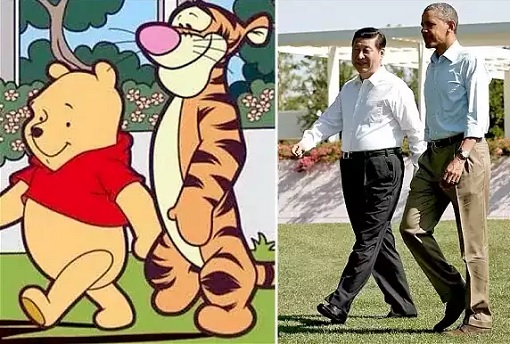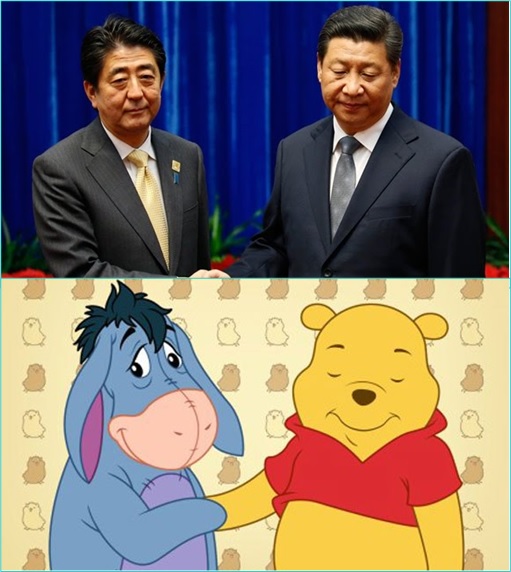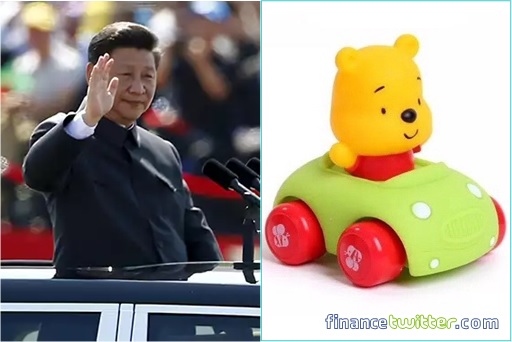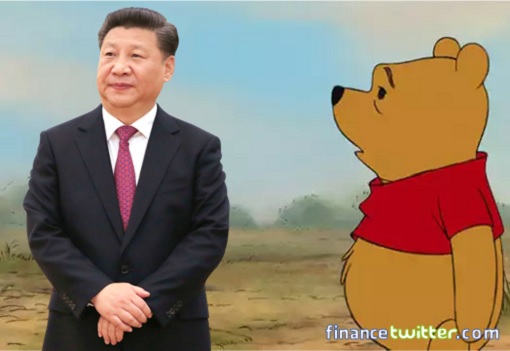President Xi Jinping’s anti-corruption campaign is legendary. The Chinese Communist Party has long been associated with corruption. In fact, corruption has become a culture in the Chinese government. Naturally, Xi’s crackdown on corruption has been met with huge resistance that he was accused of using it as a tool to eliminate his political rivals.
Along the way, President Xi makes tons of enemies who wanted the status quo (corruption) to remain. Nobody can tell for sure who started it but during the Chinese leader’s visit with then U.S. Barack Obama in 2013 at the Sunnylands Estate in California, naughty comparison was being made between Disney-owned Winnie the Pooh with Mr. Xi.
Apparently the meme where a side-by-side image of President Xi as Winnie and US President Barack Obama as Tigger went viral four years ago. While such a cute and funny satirical would make even Donald Trump laughs, or at least smile, it was taken as an insult to the leader of the Chinese Communist Party, never mind it was a fictional bear.

The following year in 2014, social media took the joke to a new level – the comparison of President Xi’s meeting with Japanese Prime Minister Shinzo Abe, who was pictured as Eeyore, the sad donkey, alongside the bear. The Chinese social media didn’t stop there. A photo of Xi standing up through the roof of a parade car, next to a picture of Winnie the Pooh in a toy car was unleashed.
That photo was so viral that political consultancy Global Risk Insights named it the “most censored image of 2015”. The friendly yellow bear, however, met an unfriendly response – the Chinese government added “Winnie the Pooh” to its internet search blacklist. Beijing wasn’t amused with the playful trend, and thought it was an effort to undermine the dignity of President Xi.
With the country’s 19th Communist Party Congress coming this autumn, the last thing Beijing wants is for the social media to again make fun of the nation’s top leader. The once-in-five-years event is too serious and sensitive for some jokes to disrupt “a smooth and stable congress”, where the world’s economic superpower is set to see handover of power at the top of the party.

Xi Jinping will be using the Congress, which marks the beginning of his second term in office, to further solidify his grip on power by promoting allies and sidelining those seen as a threat. Already, many believe it’s hard for him to give up power after the next 5-year term. Obviously, the president cannot afford any cracks in the absolute loyalty he demands.
Now, Winnie the Pooh is banned altogether on Sina Weibo, China’s version of Twitter. A collection of animated gifs featuring the bear were also removed from social messaging app WeChat over the weekend. Attempts by Chinese netizens to post the Chinese characters for Winnie’s name on Weibo returned the message “content is illegal”.
Qiao Mu, assistant professor of media at Beijing Foreign Studies University, said – “Historically, two things have been not allowed – political organising and political action. But this year a third has been added to the list – talking about the president.” Some online commentators were actually detained after posting remarks about the president.

It’s not hard to understand why bloggers and netizens took to social media posting such comparison. In a kingdom where its censors will not tolerate ridicule of the country’s leader, comparing President Xi to Winnie the Pooh was one of creative and clever ways to get around censorship. After all, who could blame an innocence-looking and adorable teddy bear for humiliating an economic superpower leader?
But was there a secret message behind comparing the U.S. created honey-loving bear with the Chinese leader? Absolutely – Winnie the Pooh was described as “a bear of very little brain”. Therefore, President Xi Jinping is essentially described by Chinese netizens as a leader with little substance – a dumb leader.

Other Articles That May Interest You …
- China’s New Cybersecurity Law Effective Today – What Does It Mean To You
- India Boycotts $100 Billion OBOR – Sees Through China’s Territorial Ambitions
- China Invasion – Top 10 American Iconic Brands Now Owned By Chinese
- Here’s How China Hurts U.S. – Boycotts All South Korean Products
- US Sent An Aircraft-Carrier Strike Team, And There’s Nothing China Can Do About It
- China Is Terrified – Trump Has The Power & Ability To Screw Its Economy
- Here’s Why Najib Should Be Encouraged To Sell More Assets To China

|
|
July 17th, 2017 by financetwitter
|


|

|

|

|

|

|




























Comments
Add your comment now.
Leave a Reply